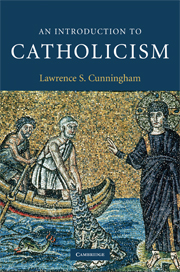Book contents
- Frontmatter
- Contents
- Illustrations
- Preface
- Acknowledgments
- 1 The many meanings of Catholicism
- 2 Roman Catholicism
- 3 Being Catholic: Some typologies
- 4 Catholicism in place and time
- 5 Catholic worship
- 6 The rule of faith
- 7 Catholic spirituality
- 8 The missionary character of Catholicism
- 9 Catholic reformation(s)
- 10 The moral life
- 11 The contemporary Catholic Church
- 12 Reading Catholicism: Bibliographical resources
- Index
- References
7 - Catholic spirituality
Published online by Cambridge University Press: 05 June 2012
- Frontmatter
- Contents
- Illustrations
- Preface
- Acknowledgments
- 1 The many meanings of Catholicism
- 2 Roman Catholicism
- 3 Being Catholic: Some typologies
- 4 Catholicism in place and time
- 5 Catholic worship
- 6 The rule of faith
- 7 Catholic spirituality
- 8 The missionary character of Catholicism
- 9 Catholic reformation(s)
- 10 The moral life
- 11 The contemporary Catholic Church
- 12 Reading Catholicism: Bibliographical resources
- Index
- References
Summary
INTRODUCTION
The word “spirituality” in our own time has come to mean something quite vaguely attached to feelings – thus, one commonly hears the phrase “I am spiritual but not religious.” Historically, however, the term “spiritual” meant one who lived under the impulse of the Holy Spirit as a follower of Jesus Christ. The scriptural root for this usage derives from a classic passage in Saint Paul's Letter to the Romans (8:1–17) where Paul sharply distinguishes those who live “according to the flesh” from those who live according to the Spirit. For Paul, the contrast between “flesh” and “spirit” should not be confused with some kind of radical dualism, say, between, body and soul. For Paul, the word “flesh” (and Paul distinguishes “flesh” from “body”) means those carnal impulses that degrade a human person and are further identified with death. By contrast, those who live “according to the Spirit” are those who have the Spirit within them and are further identified to be, according to adoption, what Jesus is by nature: “Children of God” who are able to cry out and call God “Abba” (see Rom. 8:15ff; and Gal. 4:4–6).
A person who lives in the Spirit is one who is linked to Christ through participation in his death and resurrection through baptism, by partaking in his body and blood through the eucharist, by being a part of his body in union with all others who make up the assembly of Christian believers, who follow his word, and await his coming in the final resurrection.
- Type
- Chapter
- Information
- An Introduction to Catholicism , pp. 147 - 171Publisher: Cambridge University PressPrint publication year: 2009

